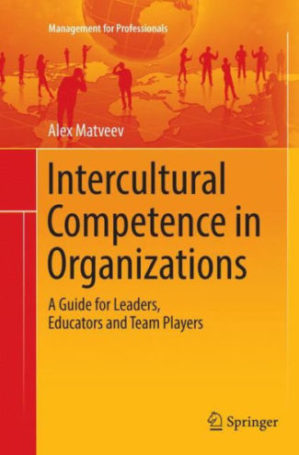This 3-part blog series is a book review of Dr. Alex Matveev’s excellent book Intercultural Competence in Organizations. Alex and I met during SIETAR USA in 2017 where we were featured as published authors. We immediately felt a Central-Eastern European bond since he is Russian and I’m part Czech. I ordered his book Intercultural Competence in Organizations on the spot. I’ve used it as a resource for two years. Alex’s work is inspiring and invaluable to our intercultural field so I am sharing some of his wisdom.
In our first blog we summarize Matveev’s definition of Intercultural Competence and how it benefits individuals, teams, businesses and nations. Key to intercultural competence is knowledge and skill acquisition, as well as self-awareness and the right attitude.
In our second blog, we look at several foundational concepts that help us understand intercultural competence and tools to put it in action.
Uncertainty Reduction
Whether at home or abroad, most of us have had the experience of being somewhere new. While often exciting and inspiring, unfamiliar places can also bring about anxiety and uncertainty brought on by the lack of culturally familiar cues ranging from greetings and gestures to food and language.
A much-studied topic is that of culture shock, which can manifest physically and emotionally when someone moves to an unfamiliar context. Social scientists and psychologists have documented symptoms including irrational fears like that of food or safety, insomnia, depression, and general health concerns. This can occur as part of a long-term assignment in another country, or as an element of overseas performance when team members spend short amounts of time in an unfamiliar global place.
Fundamental to effective intercultural competence is understanding the reality of culture shock and its effect on adjustment, communication, and performance. Three foundational assumptions help us understand Uncertainty Reduction Theory:
- Uncertainty is universally unpleasant and the anxiety it can cause can be more prevalent in intercultural encounters, rooted in the fear of negative encounters.
- Therefore, reducing uncertainty is a key priority for strangers when they meet. One of the means by which this is done is gathering information about other cultural groups including beliefs and values, which helps predict behaviors during interactions.
- Engaging in communication can reduce uncertainty by strengthening personal relationships. This in turn improves efficacy in management and decision-making both in the short and long term.
Cultural Dimensions
So, your organization has sent you on a new assignment in a country you haven’t been to and you want to do your research. You have a firm understanding of the idea of uncertainty and the need to mitigate it. Where to begin?
A useful tool to intercultural competence is that of cultural dimensions or cultural orientations. These provide a framework for understanding new cultures in relation to your own. Matveev discusses several cultural dimensions from frameworks developed by himself as well as pioneers in the field such as Geert Hofstede and Edward T. Hall and Fons Trompenaars.
Examples of cultural dimensions include:
- Individualism vs Collectivism. The degree to which cultures value individual versus group goals. This will influence how teams work together, how decisions are made and how relationships are approached.
- Direct vs Indirect or Low Context vs High Context. Low context cultures primarily use words and language to convey messages. High context cultures heavily rely on non-verbal cultural cues, body language and shared context to imply meaning.
- Power Distance. This deals with how power is distributed throughout a culture and the degree to which members within that culture accept it to be unequally distributed. This determines organizational and societal structure, including hierarchy, authority and status.
When we consider cultural interactions on a ground level – through business and leisure travel, virtual conference calls, multicultural teams, and day-to-day interactions on the street – we begin to realize just how much we can gain by reducing uncertainty and building intercultural competence for people and organizations. Now that we understand several key concepts, we’ll continue our discussion of Matveev’s book in the next blog where we’ll explore strategies for organizations to measure and strengthen intercultural competence.
Sharon Schweitzer and Ashley Blake co-wrote this post. Sharon Schweitzer, J.D., is a cross-cultural trainer, attorney, modern manners expert, and the founder of Access to Culture. In addition to her accreditation in intercultural management from the HOFSTEDE Centre and the Intercultural Communication Institute, she serves as a Chinese Ceremonial Dining Etiquette Specialist in the documentary series Confucius was a Foodie, on Nat Geo People. She is the resident etiquette expert on two popular lifestyle shows: ABC Tampa Bay’s Morning Blend and CBS Austin’s We Are Austin. She is regularly quoted by BBC Capital, Investor’s Business Daily, and Fortune. Her Amazon #1 Best Selling book in International Business, Access to Asia: Your Multicultural Business Guide (Wiley 2015), now in its third printing, was named to Kirkus Reviews’ Best Books of 2015. She’s a winner of the British Airways International Trade Award at the 2016 Greater Austin Business Awards and the 2017 New York City Big Book Award for Multicultural Nonfiction.
Ashley Blake is the founder of Traverse Journeys, an impact-based adventure travel provider with a focus on social and environmental responsibility. Ashley holds an MA in Media Studies from the University of Texas at Austin, focusing her research on music for social change in Brazil. Ashley also holds a BA and BS in International Studies and Print Media from Oregon State University with minors in Spanish and Music. Ashley’s academic and professional background merge in her work in project management, consulting, and international tourism. Ashley is a fluent Spanish speaker with basic skills in Portuguese, German and Arabic with experience in more than 40 countries across the globe. Ashley is passionate about connection, communication and coordination in order to link others with the opportunities and experiences that promote personal, professional and community growth.



Leave A Comment